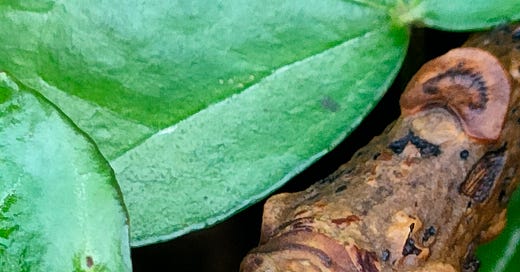I have a tendency not to see the woods for the trees. My partner gets frustrated with me because I start intense conversations just at the moment he is most stressed about traffic.
I find it very difficult to see the bigger picture. Or to remember the wider context of what is happening.
This has led to many faux pas. (Like when I talked loudly about how marriage is a heterosexual prison created by men at my friend's hen-do.)
But this tendency to zoom in is also one of my most valuable skills. I couldn't have become a novelist without it.
I remember someone pointing out to me how zoomed in the perspective of Iris - the protagonist of my first novel, Infinite Sky - is. They said it like I had made an interesting choice and I just thought, huh. Because it had never occured to me to zoom out.
Apparently this is an actual thing to do with autism. I just read a paper about 'zoom-out attentional impairment’, the “inability to experience wholes without full attention to the constituent parts” that can be perceived in some autistic children.
Their tendency is to zoom in, scientists discovered through an experiment which required shifting attention from close up to further away. And their zooming out is less fluid. The scientists came up with reasons why this likely was - (“dysfunctional top-down feedback from fronto-parietal network to the early visual areas” if you're interested.)
But maybe it's just like super great to be zoomed in?
Recently I spent a while playing with the zoom function on the excellent camera on my phone and I was wrapt.
The detail here is extraordinary. Like entering another world. The world of insects and fungus.
Staring at the fragile frill of these mushrooms I felt calm and complete in a way that is not always within my repertoire.
I stayed still and focused in. Almost as though I were the camera itself. There is a microscopic world we cannot see. Mites on our faces, like tiny jumping tic tacs. Tardigrades snuffling through soil.
Taking time to zoom in makes life feel magical and extraordinary. And maybe it's possible to get better at zooming out.
So long as I am with people who can forgive me for my frequent forgetting of context, it mostly works out okay.
Anyway, I'm letting go of worrying about all the things I can't do, and working to focus on what I can do instead. I hope you can do the same.
🥳 🧐 🙌 🐱 ✌️
If you like my writing (and can afford it), then join my elite crew of paid subscribers. You will get access to private posts and chats, and you can comment on all pieces, too.
And if that’s not for you, then please join my quest to help autistic people live better, by sharing this newsletter. 😻
You can connect with the Autistic community on Twitter. If you have a question, use #ActuallyAutistic or #AskingAutistics (or both). You can also visit The Autism Self Advocacy Network and the Autistic Not Weird Facebook page and website.
Chelsey Flood is the author of Infinite Sky and Nightwanderers, and a senior lecturer in creative writing at UWE University. She writes about freedom, addiction, nature and love at Beautiful Hangover, and autism and self-compassion at Polite Robot. She is also working on a new YA novel.







This is interesting! In my career I've but a large emphasis on learning to zoom out, to see the bigger context, and to understand how the details are part of a bigger picture. I've been working at this for many years and it's has been part of my role for a while to help others understand the big picture as well. It was not intuitive for me! In the business world, "zooming out" is a valuable leadership skill. But I miss the days when my focus was more zoomed in. I felt much more creative in those days. I did more creative writing, I would take pictures (always of close up things). There is value in both depending on context. I hadn't thought about it as part of autism though - very interesting.